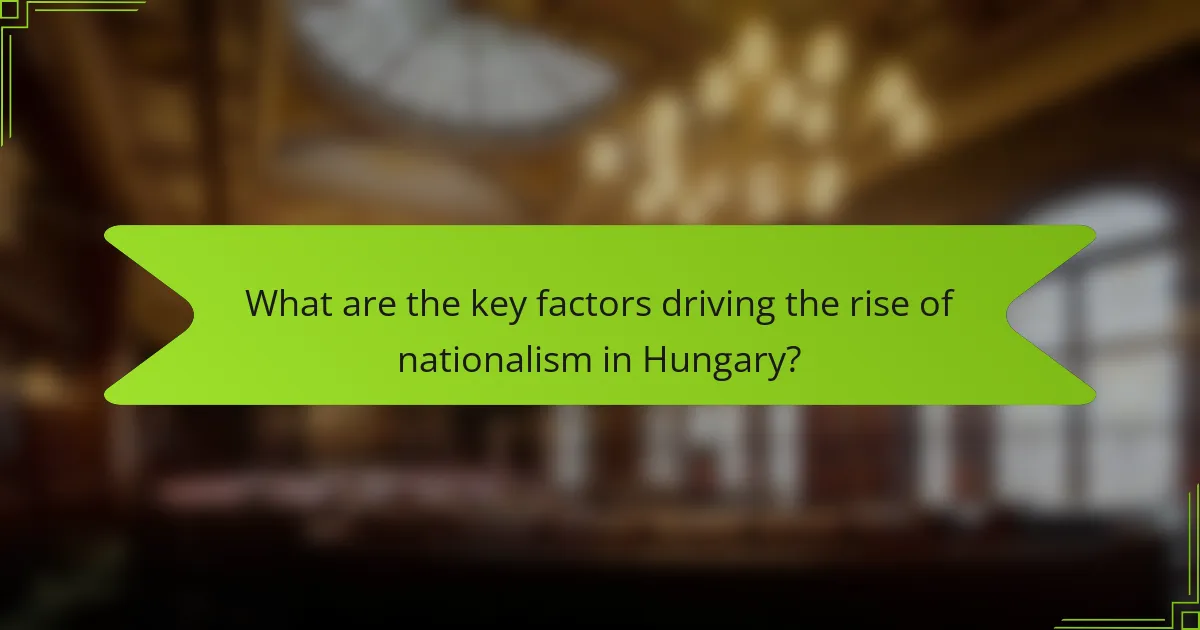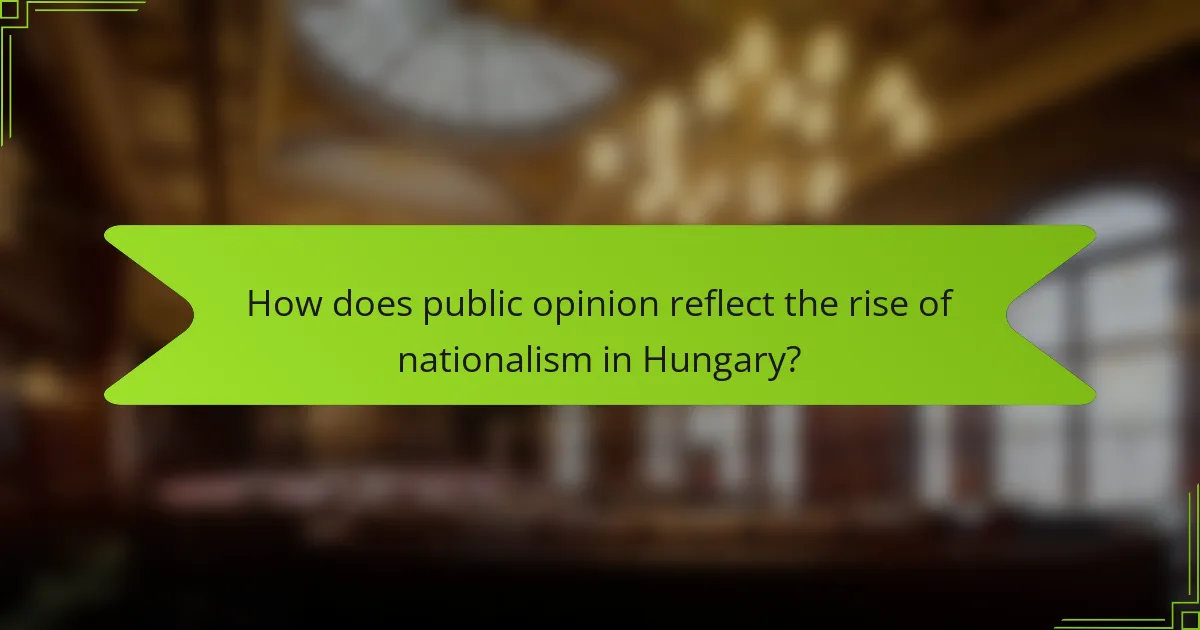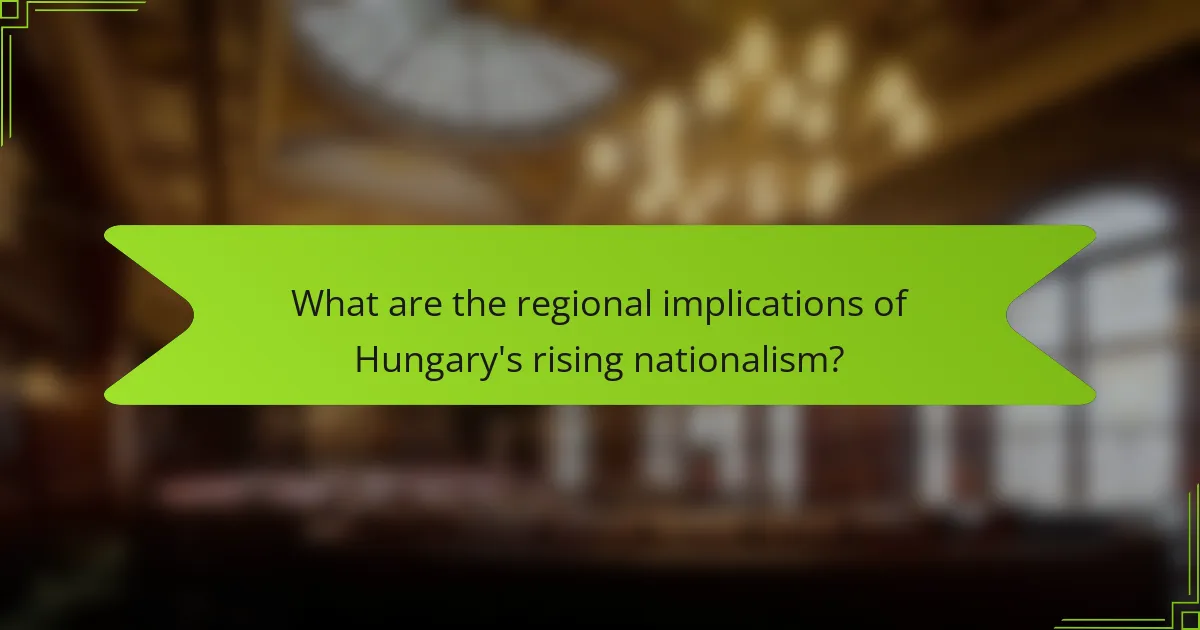The article examines the rise of nationalism in Hungary, focusing on key factors such as economic concerns, cultural identity, and political leadership. Economic stagnation and unemployment have led to public dissatisfaction, which supports nationalist policies promising improvement. Cultural identity preservation amidst globalization and strong political leadership from the Fidesz party under Viktor Orbán further fuel this nationalist movement. Public opinion reflects a significant majority favoring national identity, with resistance to immigration and substantial electoral support for nationalist parties. The implications of rising nationalism extend regionally, potentially affecting diplomatic relations and ethnic tensions with neighboring countries, as well as Hungary’s standing within the European Union.

What are the key factors driving the rise of nationalism in Hungary?
The key factors driving the rise of nationalism in Hungary include economic concerns, cultural identity, and political leadership. Economic challenges, such as stagnation and unemployment, have fueled dissatisfaction. This dissatisfaction often translates into support for nationalist policies that promise economic improvement. Cultural identity plays a significant role as Hungarians seek to preserve their heritage amidst globalization. Political leadership, particularly from the Fidesz party under Viktor Orbán, has promoted a strong nationalist agenda. This includes rhetoric that emphasizes sovereignty and critiques the European Union’s influence. Additionally, historical narratives about national pride and victimhood resonate with the public, reinforcing nationalist sentiments. These factors collectively contribute to a growing nationalist movement in Hungary.
How has Hungary’s historical context influenced its current nationalist sentiments?
Hungary’s historical context has significantly shaped its current nationalist sentiments. The Treaty of Trianon in 1920 resulted in Hungary losing two-thirds of its territory and population. This loss created a lasting sense of grievance and a desire for national restoration among Hungarians. The interwar period saw the rise of irredentism, which fueled nationalist ideologies. Post-World War II, Hungary’s experience under Soviet influence further solidified a resistance to external control. The 1989 transition to democracy allowed nationalist sentiments to resurface, emphasizing sovereignty and cultural identity. Recent political movements have harnessed these historical grievances to promote contemporary nationalism. The current government often invokes historical narratives to bolster national unity and identity.
What significant events in Hungarian history have shaped national identity?
The significant events in Hungarian history that have shaped national identity include the establishment of the Kingdom of Hungary in 1000 AD. This event marked the beginning of a centralized Hungarian state under King Stephen I. The Mongol invasion in 1241 led to a transformation in military organization and fortifications. The Ottoman occupation from the 16th to the 17th century deeply affected social structures and cultural developments. The Treaty of Trianon in 1920 resulted in significant territorial losses and fostered a sense of national grievance. The 1956 Revolution against Soviet rule highlighted the desire for independence and democracy. These events collectively contributed to a strong sense of national identity and resilience among Hungarians.
How do historical narratives affect contemporary political discourse in Hungary?
Historical narratives significantly shape contemporary political discourse in Hungary. These narratives often emphasize national pride and historical grievances. They are utilized by political leaders to mobilize support and justify policies. For instance, the Treaty of Trianon is frequently referenced to evoke a sense of loss and injustice. This historical event resonates deeply with many Hungarians, influencing their views on territorial integrity. Political parties often frame their agendas around these historical contexts. This creates a narrative that fosters nationalism and unity among supporters. Consequently, historical narratives play a crucial role in shaping public opinion and political strategies in Hungary.
What role do political parties play in promoting nationalism in Hungary?
Political parties in Hungary play a significant role in promoting nationalism. They shape national identity through policies and rhetoric. The ruling party, Fidesz, emphasizes national sovereignty and cultural heritage. Fidesz uses nationalistic narratives to consolidate power. This includes promoting historical narratives that resonate with the public. Other parties, like Jobbik, also advocate for nationalist policies. They often focus on ethnic identity and territorial integrity. Political discourse frequently highlights Hungary’s historical grievances. This reinforces a sense of unity among supporters. Nationalism is a central theme in electoral campaigns. It influences voter behavior and party alignment.
Which political parties are most associated with nationalist ideologies?
Fidesz and Jobbik are the political parties most associated with nationalist ideologies in Hungary. Fidesz, led by Viktor Orbán, has promoted a strong national identity and sovereignty. The party’s policies often emphasize Hungarian culture and traditional values. Jobbik has also embraced nationalist rhetoric, advocating for the interests of ethnic Hungarians. Both parties have capitalized on public sentiment favoring nationalism. This trend reflects a broader shift in Hungarian politics towards right-wing populism. Nationalist ideologies have gained traction amid economic and social challenges in the country.
How do party platforms reflect nationalist themes and values?
Party platforms reflect nationalist themes and values through their emphasis on national identity and sovereignty. These platforms often prioritize policies that promote cultural heritage and historical narratives. They may advocate for stricter immigration controls to protect national demographics. Economic policies may focus on supporting local industries over foreign competition. Additionally, party platforms often include rhetoric that frames national interests as paramount. This can manifest in opposition to international agreements perceived as compromising national autonomy. Nationalist parties frequently utilize symbols and language that resonate with patriotic sentiments. For example, they may reference historical events that evoke national pride. These strategies aim to galvanize support among voters who identify strongly with nationalistic ideals.

How does public opinion reflect the rise of nationalism in Hungary?
Public opinion in Hungary increasingly reflects the rise of nationalism through strong support for nationalist policies. Surveys indicate that a significant majority of Hungarians favor preserving national identity and culture. For instance, a 2021 poll showed that over 60% believe in prioritizing Hungarian interests in politics. This sentiment is often echoed in public discourse and media, emphasizing national sovereignty. Additionally, political parties advocating nationalism, such as Fidesz, have gained substantial electoral support. The 2018 elections demonstrated this trend, with Fidesz securing over 49% of the vote. Public opinion also shows resistance to immigration, aligning with nationalist rhetoric. This resistance is evident in various polls, where nearly 70% of respondents oppose accepting more refugees. Overall, public opinion serves as a barometer for the growing influence of nationalism in Hungary.
What recent surveys indicate about the public’s support for nationalist policies?
Recent surveys indicate that public support for nationalist policies in Hungary is significant. A 2023 poll by the Hungarian Institute of Public Opinion found that 65% of respondents favor stronger national sovereignty. Additionally, 58% expressed support for policies that prioritize Hungarian culture and identity. The same survey reported that 70% believe immigration should be heavily restricted. These statistics reflect a growing trend towards nationalism among the Hungarian populace. The data suggests that nationalist sentiments are shaping political discourse in Hungary.
How do demographic factors influence opinions on nationalism?
Demographic factors significantly influence opinions on nationalism. Age, education, and socioeconomic status shape individuals’ perspectives. Younger individuals often favor more inclusive nationalism. Older generations may prioritize traditional national values. Higher education levels correlate with more liberal views on nationalism. Conversely, those with lower educational attainment may support more exclusionary nationalist sentiments. Socioeconomic status also plays a role; economically disadvantaged groups may align with nationalist rhetoric promising job security and cultural preservation. Research indicates that in Hungary, these demographic differences have led to varying support levels for nationalist policies. For instance, a study by the Pew Research Center found that educational attainment directly impacts attitudes towards nationalism across Europe.
What are the most common concerns among citizens regarding nationalism?
Common concerns among citizens regarding nationalism include the potential for increased xenophobia. Citizens often fear that nationalism can lead to discrimination against minority groups. Economic implications are also a concern, as some believe nationalism may harm international trade relations. Citizens worry that a strong nationalistic agenda could undermine democratic values. Historical instances of conflict fueled by nationalism raise alarm among the populace. Additionally, there is anxiety about the erosion of cultural diversity. Many citizens express concerns about the impact of nationalism on social cohesion. Overall, these concerns reflect a desire for balance between national pride and inclusivity.
How has nationalism affected social cohesion within Hungary?
Nationalism has significantly impacted social cohesion in Hungary. The rise of nationalist sentiments has led to increased polarization among different social groups. Ethnic minorities often feel marginalized due to nationalist rhetoric. This has created divisions between ethnic Hungarians and non-Hungarians. Nationalist policies have emphasized a singular national identity. Such emphasis can alienate those who do not conform to this identity. Surveys indicate a growing distrust between different communities. In recent years, anti-immigrant sentiments have surged, further straining social ties. Overall, nationalism has fostered an environment of division rather than unity within Hungarian society.
What tensions have arisen between nationalist and minority groups?
Tensions between nationalist and minority groups in Hungary have increased significantly. Nationalist rhetoric often emphasizes ethnic homogeneity. This has marginalized minority communities, such as Roma and ethnic Hungarians in neighboring countries. Discrimination and social exclusion have become more pronounced. Minority groups report feeling threatened by nationalist policies. These policies can include restrictions on language use and cultural expression. Nationalist movements have also led to protests and confrontations. The rise of far-right parties has exacerbated these tensions. Historical grievances fuel ongoing conflicts between these groups.
How do nationalist movements impact civic engagement among the populace?
Nationalist movements significantly influence civic engagement among the populace by fostering a sense of identity and belonging. These movements often mobilize citizens around shared cultural or historical narratives. Increased participation in political activities, such as voting or protests, is frequently observed. For example, in Hungary, the rise of nationalism has led to heightened voter turnout in elections. Studies indicate that nationalist rhetoric can galvanize citizens to engage more actively in civic duties. This engagement may manifest through community organizing or participation in national celebrations. Additionally, nationalist movements can sometimes polarize civic engagement, leading to increased activism among both supporters and opponents. The interplay of these dynamics shapes the overall political landscape and public discourse within the nation.

What are the regional implications of Hungary’s rising nationalism?
Hungary’s rising nationalism has significant regional implications. It influences neighboring countries’ political landscapes. The rise of nationalist sentiments can exacerbate ethnic tensions in regions with Hungarian minorities, such as Romania and Slovakia. Hungary’s government has promoted a narrative of historical grievances, which may lead to diplomatic strains. Increased nationalism may also affect Hungary’s relationships within the European Union. The EU’s commitment to democratic values can clash with Hungary’s nationalist policies. This tension may result in economic repercussions, as Hungary relies on EU funding. Furthermore, rising nationalism could inspire similar movements in adjacent countries, leading to broader regional instability.
How does Hungary’s nationalism affect its relationships with neighboring countries?
Hungary’s nationalism affects its relationships with neighboring countries by creating tensions and fostering disputes over historical grievances. The emphasis on national identity often leads to a perception of threat from Hungary’s neighbors. For example, Hungary’s focus on the rights of ethnic Hungarians in neighboring countries, such as Romania and Slovakia, has strained diplomatic relations. This nationalism is reflected in political rhetoric and policies that prioritize Hungary’s interests. Additionally, Hungary’s stance on issues like border security and migration has led to conflicts with EU partners. These factors contribute to a complex regional dynamic characterized by both cooperation and contention.
What specific disputes have arisen due to nationalist rhetoric?
Nationalist rhetoric in Hungary has led to several specific disputes. One major dispute involves tensions with neighboring countries, particularly Romania and Slovakia, over historical grievances. This rhetoric often sparks controversy regarding minority rights and territorial claims.
Another significant dispute arises within Hungary itself, between nationalist and liberal factions. Nationalist rhetoric often challenges the liberal democratic values upheld by opposition parties. This has resulted in political polarization and social unrest.
Additionally, nationalist rhetoric has fueled debates on immigration policy, with a focus on preserving national identity. This has led to conflicts over Hungary’s response to the European Union’s refugee quotas.
Overall, these disputes highlight the divisive impact of nationalist rhetoric on both domestic and international relations in Hungary.
How do regional dynamics influence Hungary’s nationalist policies?
Regional dynamics significantly influence Hungary’s nationalist policies by shaping its geopolitical strategies. The presence of neighboring countries with significant Hungarian minorities affects policy decisions. Hungary’s government often emphasizes the protection of these minorities to strengthen national identity. Additionally, tensions with countries like Romania and Slovakia over historical grievances fuel nationalist rhetoric. Economic interdependencies with Central European nations also play a role in shaping these policies. Hungary’s alignment with nationalist movements in the region reflects a broader trend of rising nationalism. This alignment often seeks to counter perceived threats from the European Union and migration. The influence of regional dynamics is evident in Hungary’s legislative actions and public discourse surrounding nationalism.
What lessons can be learned from Hungary’s experience with nationalism?
Hungary’s experience with nationalism teaches the importance of balancing national identity with inclusivity. Nationalism can foster unity but may also lead to exclusionary practices. The rise of nationalist rhetoric has influenced political decisions and public opinion significantly. For example, the government’s focus on ethnic identity has shaped policies affecting minority communities. This has resulted in social divisions and tensions within Hungary. Additionally, Hungary’s approach to nationalism highlights the risks of populism in governance. It demonstrates how nationalistic policies can impact international relations and regional stability. Understanding these dynamics is crucial for addressing similar issues in other nations.
What strategies could be employed to address the challenges posed by nationalism?
Promoting inclusive national identities can address challenges posed by nationalism. This involves fostering a sense of belonging among diverse ethnic and cultural groups. Education plays a crucial role in promoting tolerance and understanding. Schools can teach the value of multiculturalism and shared history.
Encouraging dialogue between different communities can reduce tensions. Government initiatives that support integration can also be effective. Economic policies that promote equitable development can alleviate grievances.
International cooperation can help mitigate extreme nationalist sentiments. Engaging with global organizations can provide frameworks for dialogue. Research shows that inclusive policies lead to social cohesion. For example, countries that embrace diversity often experience lower levels of conflict.
How can Hungary balance national identity with regional cooperation?
Hungary can balance national identity with regional cooperation by promoting cultural exchange while respecting sovereignty. This involves fostering dialogue with neighboring countries. Hungary can emphasize shared historical ties to strengthen regional partnerships. Economic collaboration can also enhance mutual benefits, encouraging cooperation without compromising identity. Initiatives like joint cultural festivals can celebrate national heritage and regional diversity. Hungary’s membership in organizations like the Visegrád Group supports collaborative efforts while maintaining distinct national characteristics. This dual approach allows Hungary to assert its identity while engaging constructively with its region.
What practical steps can citizens take to engage with nationalism in Hungary?
Citizens in Hungary can engage with nationalism by participating in local cultural events. These events often celebrate Hungarian heritage and identity. Joining nationalist organizations can provide a platform for political activism. Engaging in community discussions about national policies fosters awareness and involvement. Voting in national elections is crucial for influencing nationalist agendas. Supporting local businesses promotes national economic interests. Educating oneself about Hungary’s history enhances understanding of nationalism. Lastly, participating in social media discussions can amplify nationalist sentiments and connect like-minded individuals.
The main entity of the article is the rise of nationalism in Hungary, which is driven by factors such as economic concerns, cultural identity, and political leadership, particularly from the Fidesz party. The article examines how Hungary’s historical context, including the Treaty of Trianon and experiences under Soviet influence, has shaped contemporary nationalist sentiments and public opinion. It also explores the role of political parties in promoting nationalism, the impact of demographic factors on opinions, and the regional implications of Hungary’s nationalist policies. Additionally, the article addresses the tensions between nationalist and minority groups, civic engagement, and strategies for balancing national identity with regional cooperation.